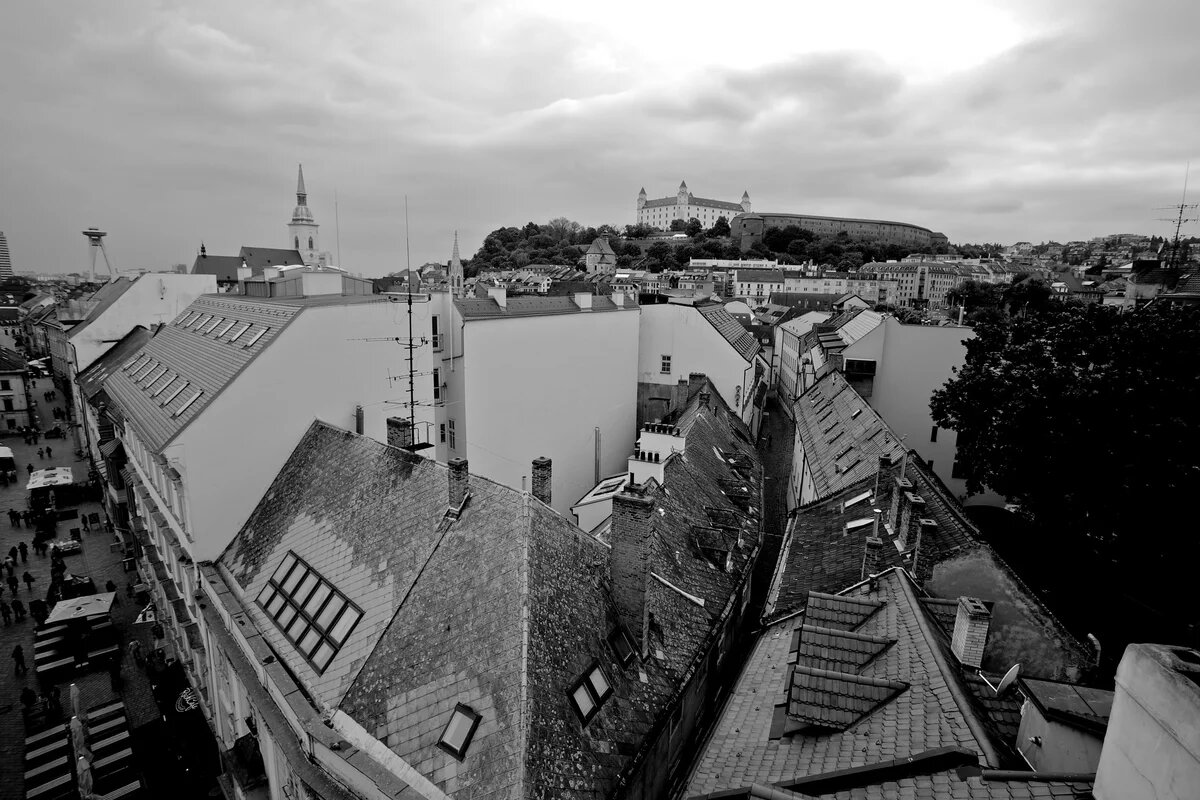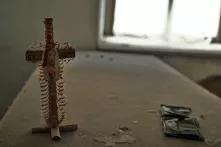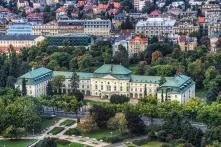
On the day after the World Refugee Day, five thousand nationalists and neo-Nazis marched through Bratislava, demanding to stop “the Islamisation of Europe” - the police had to intervene. Still, many Slovak politicians are casting about anti-immigration sentiment.
At the GLOBSEC 2015 security conference organised recently in Bratislava, Slovak Prime Minister Robert Fico and Hungarian Prime Minister Viktor Orbán concordantly rejected a European Union proposal to introduce a quota system for allocating refugees arriving in Europe from Africa and the Middle East to individual countries. The method in which the politicians formulated their disapproval, however, attested to the fact that they do not have a problem with quotas as such, but that they do not want “unwanted” foreigners to enter their countries.
But whereas in the case of the Hungarian prime minister the negative position on quotas could be interpreted as a reaction to the wave of migrants entering his country from Serbia, including ethnic Albanians fleeing socio-economic problems in Kosovo, in the case of Robert Fico this was a statement of position pro futuro without any connection to the present situation in Slovakia - essentially a preventive warning that foreigners (refugees, migrants) are not welcome here.
Neo-Nazis against immigration and the “fascist EU”
On the day after the joint anti-immigration exposé by the two Central European prime ministers - which was also World Refugee Day - Bratislava experienced a “black” - or rather “brown” - Saturday. Five thousand right-wing extremists, radical nationalists and neo-Nazis marched through the city’s streets in an authorised demonstration entitled “Stop the Islamisation of Europe! Together against the dictate of Brussels, for a Europe for Europeans!
In reality, however, this was a demonstration against immigrants, against the “fascist” European Union, NATO, the United States, Jews, Roma and the “coloured”, as well as against Slovakia’s “traitor-politicians”. The most radical segment of the demonstrators provoked clashes with police, destroyed police cars and barricades, attacked foreigners as well as those Slovaks who were not in agreement with Nazism and racism, and made it impossible to complete an international cycling competition that was being held in Bratislava that day. The police had to intervene forcefully against the instigators, arresting 140 people (including 60 citizens of the Czech Republic, according to police reports).
What took place in Bratislava on Saturday, 20 June 2015, and later in reaction to these events is symptomatic of a phenomenon that must be considered on three levels: firstly, what it means for the right-wing extremist camp and its future political ambitions; secondly, what can be inferred about mainstream Slovak politicians based on the positions they expressed immediately after the neo-Nazi rampage; and thirdly, to what extent Slovakia today is immune to the xenophobia that is pulling it into a civilisational chasm precisely at a time when, after acceding to the free, democratic, pluralistic and multicultural EU, could be characterised as the period of the greatest development and prosperity in the country’s history.
A bellicose coalition
The demonstration against “Islamisation” was organised by several Slovak radical nationalist and neo-Nazi groups and associations: the People’s Party-Our Slovakia (ĽS-NS), which in the 2013 regional elections managed to elect its leader, Marián Kotleba, to the office of chairman of the Banská Bystrica administrative region; the Nitra-based Slovak Revival Movement (SHO), a revisionist association glorifying the 1939–1945 fascist regime of the Slovak state led by Catholic priest Jozef Tiso; and the neo-Nazi group “Vzdor” (“Defiance”) from northern Slovakia known for its bestial anti-Semitism and hatred of the West, the EU and the United States, which it contends are controlled by “world Jewry”.
The irony is that those who protested against migration in Bratislava were people who travelled here from the countryside; they do not live here and the atmosphere of the capital - known for its cultural, ethnic and linguistic diversity - is foreign to them. In fact, as Czech Radio correspondent Petr Vavrouška learned, the main organiser of the “brown” Saturday in Bratislava, Lukáš Kopáč, is himself an economic migrant living in Italy, where he relocated several years ago for work (he was initially employed as a fruit-picker).
Hitherto, there have been rivalries and differences among these nationalist groups with respect to their means of mobilising supporters and their overall relationship to the state. Some of the radical nationalists have advocated the possibility of infiltrating the existing system with the goal of bringing it down from within. Others, the “irreconcilables”, preferred a course of destroying the system from the outside through forceful attacks on state institutions and ideological opponents. The issue of migration into the EU, which has been fuelling a xenophobic mood in the country for several months now, has created a space for unity of action among these ideologically similar groups. It is an issue that can be used, for example, to divert attention away from the failures of Marián Kotleba’s tenure as chairman of the Banská Bystrica administrative region, which has been marked by nepotism, administrative incompetence in using EU funds, and worsening problems in the areas of education, health care and social welfare.
The demonstration of several thousand in the capital, which attracted neo-Nazis and their supporters from around Slovakia (but also from the Czech Republic and Poland) contributed to forming an image of strengthening and unifying defenders of a “white Europe” against “coloured parasites”. Certain representatives of the neo-Nazi scene even announced that all “truly national” (i.e. radical nationalist) groupings would unite for next year’s parliamentary elections in order to surpass the five-percent threshold and enter Slovakia’s National Council (voter preference for ĽS-NS in public opinion polls is currently around 1.5 percent). The most likely variant appears to be for representatives of several right-wing radical organisations to contest the elections on the ĽS-NS candidate list, provided the party leadership ultimately opts for such a solution. Whether a joint candidate list of radicals will be able to compete successfully with the traditional nationalists in the Slovak National Party (SNS) is an open question.
Floundering politicians
How did Slovak politicians react to the neo-Nazi demonstration in Bratislava? With embarrassment, opportunism, and especially - euphemistically speaking with respect to some of them - “speculative pragmatism”.
The liberal media responded with outrage to Robert Fico’s initial reaction, in which the chairman of the “social democratic” Smer-SD party did not clearly condemn the instigators, but merely reprimanded them for “banging on an open door” (i.e. for not noticing all that he, Slovakia’s prime minister, has been doing in the EU to reject quotas for migrants). In a single breath, he criticised Brussels (“Almost everyone in Brussels is living outside reality.”), asserting that the EU does not understand the situation “on the ground”, i.e. in Slovakia and in Central Europe generally, which is attested to - logically - by the Bratislava demonstration.
Two days after this neo-Nazi pogrom, and after the frightening details of what had gone on had appeared in the media (for example, that neo-Nazis threw stones at a Saudi Arabian family with a child in a stroller), the Slovak prime minister issued a statement clearly condemning the extremists’ actions. As part of the statement, he praised the police for their good work, which, however, he compared to the work performed by their colleagues in eastern Slovakia during a raid on a Romani settlement in the town of Moldava nad Bodvou in August 2013. Officially, the raid in Moldava was targeted at “local criminal elements”, but in fact it became an example of police brutality against Roma which provoked protests by human rights activists and Slovakia’s ombudsman for human rights, Jana Dubovcová.
The overall wording of Fico’s reaction to the extremists’ demonstration revealed that this “social democratic” politician is more concerned about losing support for his party among voters who strictly oppose the arrival of refugees in Slovakia than he is about right-wing radicals and nationalists. Fico further corroborated this by entertaining the possibility of organising a referendum on refugees, which - should it actually take place - will only stoke the anti-immigration discourse and benefit the extremists.
A joint counter-demonstration? An unrealised ideal
Representatives of the centre-right opposition parties - SDKÚ-DS, Most-Híd, SaS, KDH and SKOK - condemned the neo-Nazis’ actions. The acts of violence on the part of the extremists were sharply condemned by President Andrej Kiska, who has repeatedly called upon Slovaks to extend a helping hand to refugees from Africa and Asia, and not to reject their arrival in Slovakia (this would involve c. 800 persons under the proposed quota for Slovakia).
Representatives of the SNS, fearing the loss of its nationalistically orientated voters to the extremists in ĽS-NS, did not utter a word of condemnation for the neo-Nazi demonstration. MP Igor Matovič, leader of the OĽaNO movement, attempted to distinguish the “decent people” who participated in the neo-Nazi march - allegedly because they did not approve of how the EU is addressing the refugee problem - from the violent “extremists” and “fascists”, and called upon other political parties to undercut the extremists by taking a harder line on the migration agenda.
The possibility that competing with the extremists on who is more radical and “national” may not necessarily lead to a victory for democratic forces but, to the contrary, may actually strengthen the extremists is evidently something that Igor Matovič wants to explore personally with his own political movement. In any case, the idea that mainstream Slovak politicians would respond to the neo-Nazi march in Bratislava by organising a joint counter-demonstration in protest remains in the realm of unrealised ideals.
Xenophobia and a lack of empathy
According to a representative public opinion poll conducted by Polis Slovakia in June of this year, 70.1percent of Slovak respondents answered “no” to the question “Are you for Slovakia admitting refugees from the Middle East and North Africa based on the quotas proposed by the European Union?” (such respondents constituted 81.5 percent of Smer-SD voters). To the question “Do you think these refugees pose a threat to the security of Slovakia and its residents?”, 63.4 percent of respondents answered “yes” (such respondents constituted 74.3 percent of Smer-SD voters). Slovakia’s membership in the EU still enjoys relatively strong support among rank-and-file citizens, but a significant portion of them perceive it through the lens of the advantages that it brings to the country (the possibility to travel, work, study and live freely in other European countries, the possibility to draw EU funds, etc.).
Many Slovaks clearly do not understand the fact that EU membership also involves certain obligations and in particular the need to show solidarity with partner countries encountering difficulties. Notable are the low level of empathy in Slovak society and an absence of compassion for the weak - for those who need immediate and effective help. It is also surprising that many Slovaks seem to have forgotten that for many years Western countries admitted immigrants from Slovakia who had come for a better life and always accepted them with open arms (at the beginning of the 20th century, during the economic crisis in the 1920s, after 1948, and after 1968).
It is not surprising, however, that in an atmosphere marked by fear and xenophobia many Slovak politicians are casting about, and some of them are attempting to extract political capital from anti-immigration sentiment. They forget that extremism threatens not only migrants but also the majority population, who in consequence of the activities of radicals risk losing their freedom, compromising their democracy, and moving to the precipice of an abyss from which the morass of hatred, instability and insecurity is just a step away. The subsequent return to normalcy can be immensely difficult and painful.


